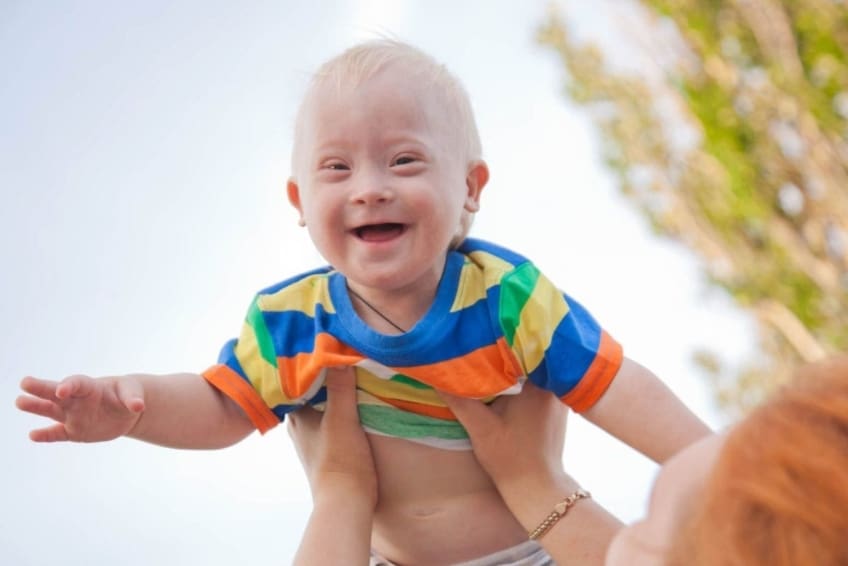
Down syndrome is a genetic condition. A person who has Down syndrome is born with an extra copy of the 21st chromosome. It can be detected during pregnancy by ultrasound or with genetic testing, or at birth. Down syndrome causes some physical and intellectual disabilities. Most of the time, it’s at a moderate level. If you have a baby with Down syndrome, you’ll need to care for, talk to, play with, and love them like any other infant. It’s important to have high expectations for your baby with Down syndrome.
Path to improved development
In many ways, children who have Down syndrome are like other children. They have the same moods and emotions, they like to learn new things, play, and enjoy life. You can help your child develop by providing as many chances as possible for them to do these things. Help your child have positive experiences with new people and places.
Every baby born with Down syndrome is different. As your new baby grows, you’ll need to pay special attention to his or her physical and intellectual development. Your baby also may have some health problems that require extra care. Not all babies born with Down syndrome have health problems. Not all babies will have the same health problems.
Physical health: Babies who are born with Down syndrome are more likely to have:
- Feeding issues. Learning to breastfeed or suck a bottle may take your baby longer to learn. Breastfeeding is good for all babies, including babies who have Down syndrome. Your doctor, a nurse, a feeding therapist, or another mom who has a baby with Down syndrome can provide tips and special training.
- Heart defects. Some heart problems will require surgery within the first year. Other problems will correct themselves over time. If your baby has a heart problem, your doctor will refer you to a cardiologist. They will monitor your baby’s heart health until the problem is corrected.
- Hearing issues. Some babies will have partial hearing loss. Babies who have Down syndrome have smaller Eustachian tubes (part of your inner ear). This causes fluid buildup. That can be relieved with tubes. Your doctor will surgically insert the tubes to drain the fluid. Some babies have permanent nerve damage. This can cause permanent hearing loss. Hearing aids often help your child hear. Without treatment, the hearing loss can affect your baby’s speech development.
- Vision problems. This might include cataracts or other eye issues requiring glasses.
Less likely health issues include:
- Intestinal blockage at birth requiring surgery
- Hip dislocation
- Thyroid disease
- Iron deficiency anemia
- Leukemia in infancy or early childhood
Developmental milestones
Your baby will reach infant and toddler milestones. However, it will take them a little longer. Early intervention support services such as physical, speech, and occupational therapies can help children who have Down syndrome develop these skills:
- Motor skills (crawling, walking, feeding, dressing, handwriting)
- Language skills (talking and vocabulary development)
- Social skills (turn-taking, sharing, eye contact, manners)
- Academic skills (early reading, counting)
The earlier your baby begins therapy, the better they will develop. Many cities have support groups and community resources to help parents who have children with Down syndrome. These resources also are helpful for siblings and other family members. Your doctor can tell you where to find these resources in your community.
Things to consider
In most cases, for every 100 couples who have another baby, 1 will have another baby with Down syndrome. If you’re planning on having more children, talk with your doctor. Your doctor can help you decide whether to seek genetic counseling before you become pregnant again.
When you first learn that your baby has Down syndrome, you may feel disappointment, grief, anger, frustration, fear, and anxiety about the future. These feelings are all normal. Talking to other parents of children who have Down syndrome can be helpful. They know how you’re feeling. You also can talk to your family doctor or visit a support group. These resources let you share your feelings and get additional information.
Questions to ask your doctor
- Do babies who have Down syndrome have low muscle tone?
- Will my baby learn to read?
- Will my baby grow up to be independent?
- How can I tell if I am sad about my baby’s diagnosis or if I’m suffering from post-partum depression?
Resources
![]()
Copyright © American Academy of Family Physicians
This information provides a general overview and may not apply to everyone. Talk to your family doctor to find out if this information applies to you and to get more information on this subject.




